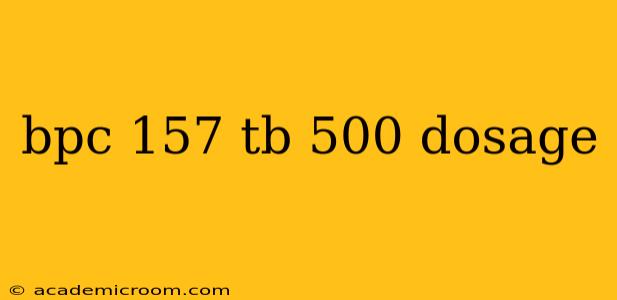The peptides BPC 157 and TB 500 have gained popularity for their potential therapeutic benefits. However, it's crucial to understand that these are research chemicals, not FDA-approved medications, and their use should be guided by a qualified healthcare professional. This article provides information on dosage and related considerations for research purposes only and is not medical advice. Always consult with a doctor before using any peptide therapy.
What are BPC 157 and TB 500?
BPC 157 (Body Protective Compound 157) is a pentadecapeptide that has shown promise in promoting tissue repair and healing in various animal studies. It's believed to influence multiple cellular pathways involved in wound healing, inflammation, and gastrointestinal health.
TB 500 (Thymosin Beta-4) is a naturally occurring peptide found in most human cells. Research suggests it plays a vital role in cell migration, wound healing, and angiogenesis (formation of new blood vessels).
Common Dosages for BPC 157 and TB 500 (Research Purposes Only)
Dosage recommendations for both peptides vary considerably depending on the individual, the specific condition being treated, and the route of administration. There's no universally agreed-upon optimal dosage. The information below is for informational purposes only and shouldn't be interpreted as a prescription.
-
BPC 157: Common research dosages range from 250 mcg to 1000 mcg per day, administered via subcutaneous injection (under the skin). Some studies have used higher dosages, but this should only be done under strict medical supervision. Frequency can vary from once daily to twice daily, or even divided into multiple smaller doses throughout the day.
-
TB 500: Common research dosages range from 250 mcg to 500 mcg twice a week, typically administered via subcutaneous injection. Again, higher dosages have been explored in research, but this should be done under the guidance of a qualified professional.
How are BPC 157 and TB 500 Usually Administered?
Both BPC 157 and TB 500 are most commonly administered via subcutaneous injection. This involves injecting the peptide just beneath the skin, typically using an insulin syringe. While oral administration has been explored, subcutaneous injection is generally considered more effective due to better absorption rates.
Are there any side effects associated with BPC 157 and TB 500?
While generally considered well-tolerated, some individuals may experience mild side effects. These can include:
- Injection site reactions: Redness, swelling, or mild pain at the injection site are possible.
- Gastrointestinal issues: Some users report nausea, diarrhea, or other digestive disturbances.
- Headaches: Headaches are a less frequently reported side effect.
It's important to note that these side effects are generally mild and temporary. However, if you experience any severe or persistent adverse reactions, discontinue use and consult a medical professional immediately.
What are the differences between BPC 157 and TB 500?
While both peptides are involved in tissue repair and healing, they have distinct mechanisms of action and are often used for different purposes. BPC 157 is frequently studied for its effects on the gastrointestinal tract, while TB 500 has shown promise in treating tendon and ligament injuries.
Can BPC 157 and TB 500 be used together?
Some research suggests that combining BPC 157 and TB 500 may have synergistic effects, potentially enhancing the healing process. However, there's limited clinical data on this combination, and further research is needed to fully understand its efficacy and safety. The use of both peptides simultaneously should only be undertaken under the strict supervision of a qualified healthcare professional.
Where can I purchase BPC 157 and TB 500?
Because these are research chemicals, purchasing and use should be carefully considered and ideally done in consultation with a physician or a qualified healthcare professional. Be aware of sourcing them from reputable suppliers who provide certificates of analysis to ensure purity and quality.
Disclaimer: This information is for educational purposes only and is not medical advice. The use of BPC 157 and TB 500 should always be under the guidance of a qualified healthcare professional. This article does not endorse or recommend the use of these peptides. Always consult with a doctor before using any peptide therapy.
